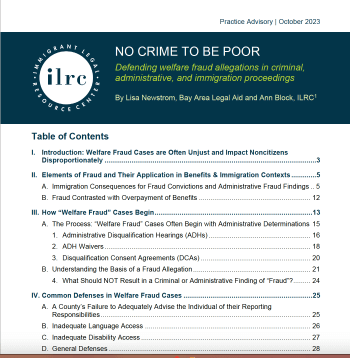Term Page
Crimes 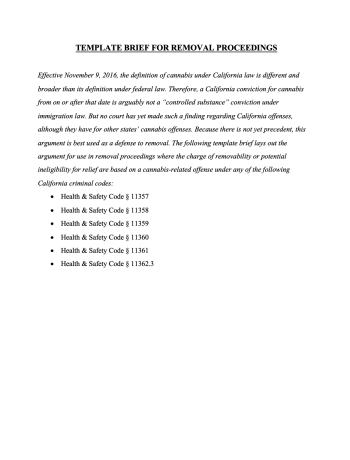
Since November 9, 2016, the definition of cannabis under California law is different and broader than the federal definition. Therefore, a California conviction for cannabis from on or after that date is arguably not a controlled substance conviction under federal immigration law. No court has yet made a finding on this issue for California offenses, but they have done so in other states with similar cannabis definitions. This template brief can be used to file a Motion to Terminate Proceedings or to file an Opposition to a Motion to Pretermit Proceedings (where the client is applying for adjustment of status or for cancellation of removal) to argue that any California cannabis conviction entered on or after November 9, 2016, is not a federal controlled substance offense.
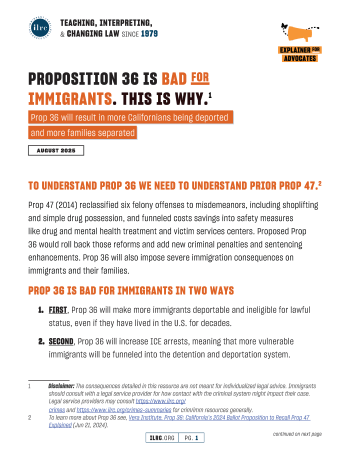
Prop 47 (2014) reclassified six felony offenses to misdemeanors, including shoplifting and simple drug possession, and funneled costs savings into safety measures like drug and mental health treatment and victim services centers. Proposed Prop 36 (November 2024) would roll back those reforms and add new criminal penalties and sentencing enhancements. Prop 36 will also impose severe immigration consequences on immigrants and their families. It will result in more Californians being deported and more families being separated. This resource provides some of the specific examples of the ways in which Proposition 36 will harm immigrants if passed.
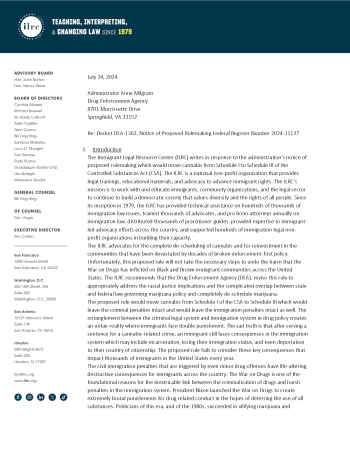
On July 23, 2024, the ILRC provide comment on the Biden Administration’s proposed re-scheduling of marijuana. The ILRC advocated for the complete de-scheduling of marijuana instead of rescheduling. The comment highlighted the racist impacts of maintaining marijuana on the schedule of controlled substances and the lack of any mitigating effect that rescheduling will have on immigration consequences of marijuana-related crimes
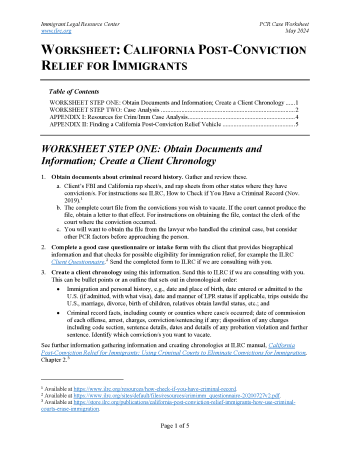
Thousands of noncitizens in California are at risk of removal because they have criminal convictions that were unlawfully imposed. California law provides several ways to eliminate these convictions with post-conviction relief (PCR). The challenge is that there are not enough PCR experts to meet the need, especially for low-income immigrants.
Criminal Convictions can have serious consequences on peoples’ lives – especially non-citizens who wish to stay in the United States. Many immigration benefits have criminal bars, meaning that certain convictions will prevent you from getting a lawful immigration status, like permanent residence (green card). This Community Explainer offers some options for those who have had certain convictions related to domestic violence or human trafficking, with insights about how to define these crimes, some example scenarios, and explanations about the benefits of a legal tool called a “vacatur.”
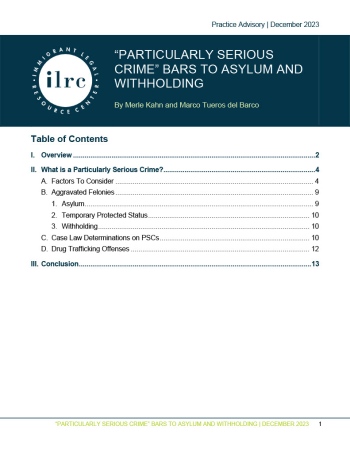
This advisory analyzes and explains the particularly serious crime bar to asylum and withholding of removal. It describes the factors to consider in determining whether a crime is a "particularly serious crime" and how to challenge a particularly serious crime determination.
Disrupting Deportation – How to Effectively Vacate your Noncitizens Criminal Convictions for Immigration Purposes
Crimes
Post-Conviction Relief
Since the federal government has failed to provide immigration reform, often times the only way to prevail in immigration court is to vacate your client’s prior criminal conviction or sentence to avoid deportation or to render your client eligible...
Marijuana and Immigrants
Crimes
Currently, thirty-eight states permit medical use of marijuana; twenty-three of these states fully permit recreational use; and the District of Columbia permits both uses. Still, marijuana remains on federal drug schedules and is treated for...
California Post-Conviction Relief for Immigrants: How to Use Criminal Courts to Erase the Immigration Consequences of Crimes
Crimes
Post-Conviction Relief
California Post-Conviction Relief for Immigrants: How to Use Criminal Courts to Erase the Immigration Consequences of Crimes guides advocates through how to use criminal courts to erase or mitigate the immigration consequences of convictions. This...
